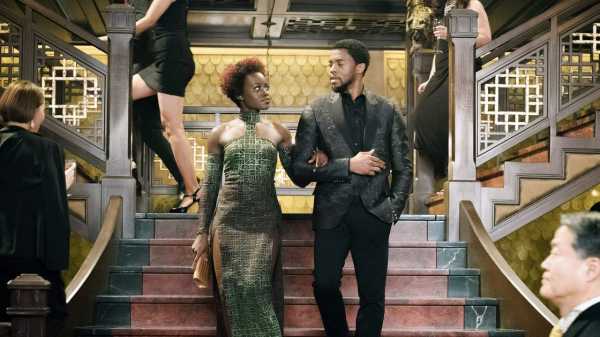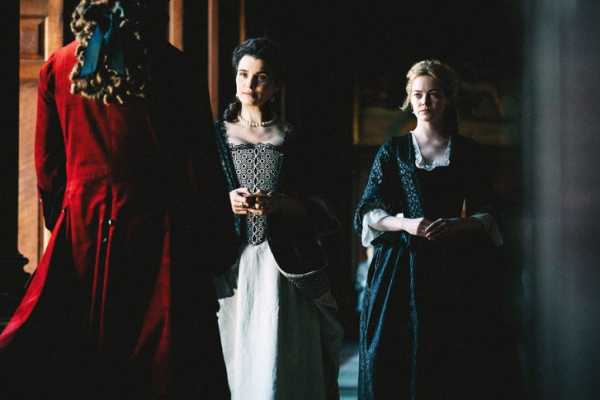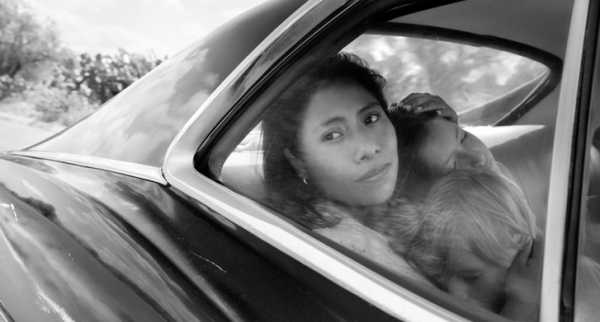
In 1953, Bertolt Brecht wrote a poem, “The Solution,” in which he satirized the East German government, wondering whether it should “dissolve the people and / Elect another?” The same might apply to the Academy of Motion Picture Arts and Sciences, which announced its 2019 Oscar nominations on Tuesday morning. Prompted by the #OscarsSoWhite campaign launched by April Reign, in 2015, the Academy rapidly added new members from the industry, notably women, people of color, and younger people. But it has not changed fast enough. Though “Moonlight,” one of the best Best Picture winners ever, won, in 2017, the Academy snapped back to its crass default last year, with its choice of “The Shape of Water.” This year, it wears its mind on its sleeve: big Hollywood dominates the list of nominations.
There are only only eight Best Picture nominees (out of a possible ten), and half are studio movies, a majority of them star-powered vehicles. The nomination of “Black Panther,” the biggest of them all, is entirely justified on artistic grounds—of the movies that are likely to be on the Academy’s radar, it is among the best—but “A Star Is Born,” “Vice,” and “Bohemian Rhapsody” are vain celebrations of the classic Hollywood method itself, and “Green Book” is an utterly ignominious nomination, replicating the racially condescending sentiments that brought “Driving Miss Daisy” to the podium twenty-nine years ago. (I wonder how many Academy members who voted for “Daisy” then voted for “Green Book” now.)
The inclusion of “BlacKkKlansman” is, however, a pleasant surprise; Spike Lee’s film is less a depiction of a historical event than a counterfactual history of grievous omissions—a story about the sorts of things that law enforcement and government could and should have been doing in recent decades, things that, if they had been done, might well have prevented the rise of the racist radical right to the White House. What’s more, Lee has been nominated for Best Director—which, grotesquely, has never happened before. (For that matter, Paul Schrader's first nomination—for the screenplay of “First Reformed”—is more than forty years overdue.)

Rachel Weisz and Emma Stone, in “The Favourite.”
Photograph by Atsushi Nishijima / Fox Seachlight Pictures / Everett
This year’s choices for Best Director contain other surprises, but dismaying ones—notably, the exclusion of Marielle Heller, for “Can You Ever Forgive Me?,” and the inclusion of Yorgos Lanthimos, for “The Favourite,” Pawel Pawlikowski, for “Cold War,” and Adam McKay, for “Vice,” which was also nominated for Best Picture. All three nominations are classic cases of showy direction earning praise. Black-and-white (“Cold War” and “Roma”) never fails to impress with its flamboyant austerity. (Both films were also nominated for Best Cinematography.) McKay’s movie is a classic case of Hollywoodsplaining, and it gratifies the industry’s self-image in a variety of ways. It reduces a history of ideology—a tale of people working to advance repugnant principles—to a criticism of those people for being unprincipled; it’s a political movie for movie people who, when they hear the word “politics,” think of office politics. What’s more, it embodies the ostensible redemption of a mere comedy director through earnest purpose. (The same is true of Peter Farrelly, the director of “Green Book”; comedies hardly ever win anything.) As far as political films go, only “Sorry to Bother You” matched “BlacKkKlansman” for imaginative energy this year; it received no nominations at all.
By contrast, Heller’s direction of “Can You Ever Forgive Me?” has a focussed and poised energy unlike that of any other film in contention. She develops a story that could easily lapse into the cartoonishness of “Vice” or “The Favourite” and instead renders it concretely tragic, without at all stinting on its elements of comedy and wonder. Melissa McCarthy and Richard E. Grant deserve their nominations, as do Nicole Holofcener and Jeff Whitty, for the screenplay, but Heller turns the tale into a piercingly analytical work of political and cultural history. The only Oscarizable of the year that has a comparable presence is “If Beale Street Could Talk,” and—though Barry Jenkins was nominated for its script, Regina King for Supporting Actress, and Nicholas Brittell for its score—Jenkins’s urgently physical direction deserves recognition, as does the movie over all.
“Roma” and “The Favourite” received ten nominations each; I’m not surprised. “The Favourite” is this year’s Anglophile historical drama, as well as the only frankly erotic story in contention. As for “Roma”—the first Netflix movie to earn a Best Picture nomination—it gives Hollywood a chance to pay homage to domestic workers without actually having to listen to what they have to say.

Yalitza Aparicio, Daniela Demesa, and Marco Graf, in “Roma.”
Photograph by Alfonso Cuaron / Netflix / Everett
The nomination of “Black Panther” for Best Picture is accompanied by six other nominations (including of Ruth E. Carter, for Costume Design, and Hannah Beachler and Jay Hart, for Production Design), but nothing for acting, writing, or direction. It’s a better and more insightful political film than most of the other nominees, thanks to Ryan Coogler’s direction and the script that he and Joe Robert Cole wrote, and its performances have a vitality and intensity that none of the ones in “Vice” or “Green Book,” and only Rachel Weisz’s performance in “The Favourite,” can rival. As for “A Star Is Born,” Bradley Cooper wasn’t nominated for Best Director. His direction of it isn’t artistically original or imaginative, but it’s brazen: he filmed himself with a vain profusion of close-ups that delivered him his Best Actor nomination. Perhaps even Hollywood’s celebration of self-celebration has its limits.
2018 was an extraordinary year for movies, and some of the year’s best movies even showed up in the roster of Oscar nominees. The gap between the industry at large and the art of the movies is growing increasingly wide, and many in the industry seem well aware of it—that’s why there was a move, widely decried and quickly walked back, by the Academy, last year, to inaugurate a new category, for Best Popular Film. My own choices for who should have been nominated suggest just how large the gap is; it’s also the increasing gap between making good movies and making good money. It isn’t only the Academy that is self-servingly and self-defeatingly behind the times; it’s Hollywood over all.
MY WISHFUL-THINKING NOMINEE LIST
Winning picks in bold.
Best Picture
“Madeline’s Madeline”
“Let the Sunshine In”
“Zama”
“Did You Wonder Who Fired the Gun?”
“Sorry to Bother You”
“BlacKkKlansman”
“Werewolf”
“Mrs. Hyde”
“The Old Man & the Gun”
“Shirkers”
Best Director
Josephine Decker, “Madeline’s Madeline”
Spike Lee, “BlacKkKlansman”
Claire Denis, “Let the Sunshine In”
Ashley McKenzie, “Werewolf”
Lucrecia Martel, “Zama”
Best Actor
Robert Redford (“The Old Man & the Gun”)
Clint Eastwood (“The Mule”)
Lakeith Stanfield (“Sorry to Bother You”)
McCaul Lombardi (“Sollers Point”)
John David Washington (“BlacKkKlansman”)
Best Actress
Helena Howard (“Madeline’s Madeline”)
Regina Hall (“Support the Girls”)
Juliette Binoche (“Let the Sunshine In”)
Melissa McCarthy (“Can You Ever Forgive Me?”)
Tyne Daly (“A Bread Factory”)
Best Supporting Actor
Richard E. Grant (“Can You Ever Forgive Me?”)
Corey Hawkins (“BlacKkKlansman”)
Xavier Beauvois (“Let the Sunshine In”)
Casey Affleck (“The Old Man & the Gun”)
Tim Blake Nelson (“The Ballad of Buster Scruggs”)
Best Supporting Actress
Miranda July (“Madeline’s Madeline”)
Sissy Spacek (“The Old Man & the Gun”)
Shayna McHayle (“Support the Girls”)
Aline and Elise Charles (“Jeannette: The Childhood of Joan of Arc”)
Lola Dueñas (“Zama”)
Best Original Screenplay
“Sorry to Bother You”
“Madeline’s Madeline”
“Support the Girls”
“Let the Sunshine In”
“Golden Exits”
Best Adapted Screenplay
“BlacKkKlansman”
“Zama”
“The Old Man and the Gun”
“Can You Ever Forgive Me?”
“The Mule”
Best Foreign-Language Film
“Let the Sunshine In”
“Zama”
“Mrs. Hyde”
“Claire’s Camera”
“Jeannette: The Childhood of Joan of Arc”
Best Documentary
“Did You Wonder Who Fired the Gun?”
“Shirkers”
“Infinite Football”
“Monrovia, Indiana”
“The Rest I Make Up”
Best Cinematography
Ashley Connor (“Madeline’s Madeline”)
Scott Moore (“Werewolf”)
Travis Wilkerson (“Did You Wonder Who Fired the Gun?”)
Guillaume Deffontaines (“Jeannette: The Childhood of Joan of Arc”)
Rob Tregenza (“Gavagai”)
Best Production Design, a.k.a. the Wes Anderson Award
“Isle of Dogs”
“Black Panther”
“Shirkers”
“Scarred Hearts”
“Notes on an Appearance”
Best Film Editing
“Madeline’s Madeline” (Harrison Atkins, Josephine Decker, Elizabeth Rao)
“The Old Man and the Gun” (Lisa Zeno Churgin)
“Minding the Gap” (Joshua Altman, Bing Liu)
“The 15:17 to Paris” (Blu Murray)
“Sorry to Bother You” (Terel Gibson)
Sourse: newyorker.com






